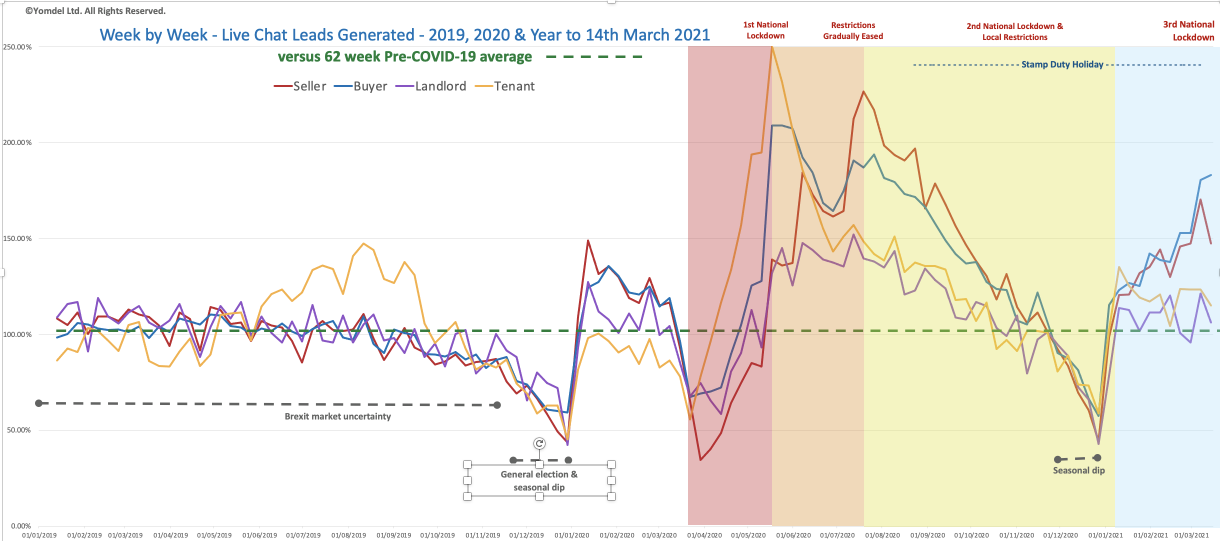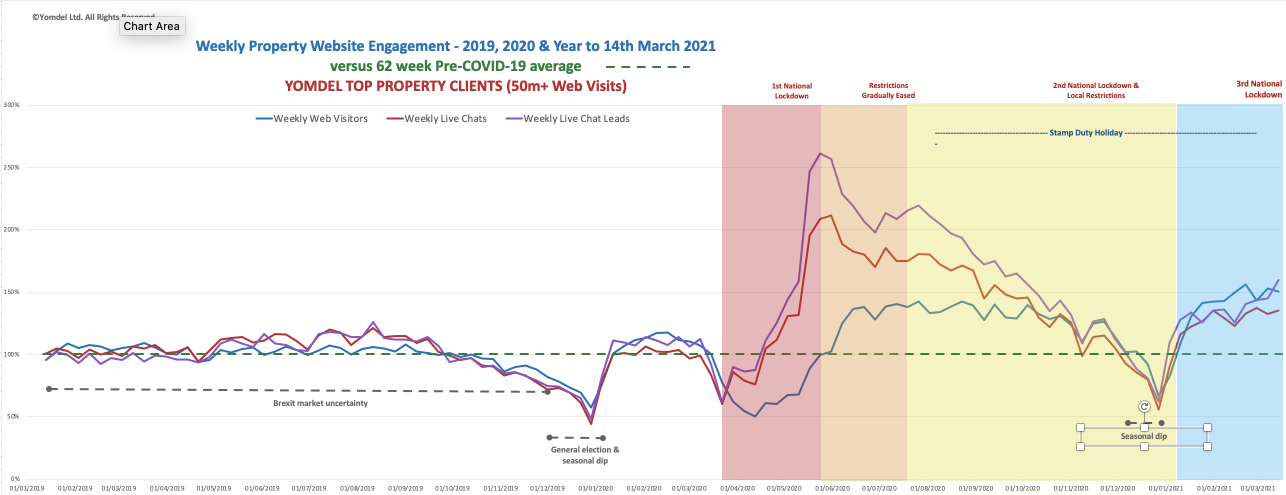New buyers entering the residential property market grew again in the past week but sentiment overall fell as any feel-good residue from the budget faded and many people focussed instead on the welcome reopening of schools after months being closed, the latest data from the Yomdel Property Sentiment Tracker (YPST) showed.
 In the week to midnight Sunday, new vendors contacting estate agents dropped almost 14%, landlords fell 13% and tenants 8%. Buyers held strong, growing more than 1% on the week to remain at levels not seen since last summer when the stamp duty holiday was first announced.
In the week to midnight Sunday, new vendors contacting estate agents dropped almost 14%, landlords fell 13% and tenants 8%. Buyers held strong, growing more than 1% on the week to remain at levels not seen since last summer when the stamp duty holiday was first announced.
While the school run took priority for many, traffic to own-branded estate agent websites remained extremely strong at 50% higher than the same week last year just before lockdown was first imposed, while the proportion engaging in live chat to make initial enquiries was up 63% year/year, which in turn delivered 74% more leads. By way of comparison, these figures are also significantly higher than the same week two years ago, with website traffic 38% higher, live chat engagement 29% higher and leads from live chat 70% higher.
Yomdel provides 24/7 managed live chat services to 3,800 estate agent offices in the UK, handling more than a 1.9m chats per year. It has analysed the data and leads captured in live chat going back to January 2019, up until week ending 14 March 2021. The website visitor data is a sample across major estate agency groups in the UK and covers in excess of 50 million unique website visits back to January 2019.
“With schools finally reopening it is no surprise that volumes of new enquires dropped across the board, but these figures remain extremely strong. Of concern though is an apparent widening of the gap between buyers and sellers meaning it is more important than ever for agents to secure new instructions to help address a growing stock imbalance. There is also a widening demand jaw between sales and lettings,” said Andy Soloman, Yomdel founder and CEO.
“But demand remains extraordinarily strong overall and the switch to digital is illustrated by the fact that the volumes of leads coming via live chat on agent websites are an astonishing 74% higher than last year and 70% higher than the same week 2019, a full year before coronavirus,” he added.
The YPST methodology establishes a base line average shown as 100% or 100, calculated according to average engagement values over the 62 weeks prior to the first national lockdown on 23 March 2020, and plots movements from there according to the volumes of people engaging in live chat, their stated needs, questions asked, and new business leads generated. Data is measured over full 24-hour periods.
New vendors were down 13.58%, or 23.15 points, to end the week on 147.34, some 47% above the average, 59% higher than the same week last year when lockdown beckoned, and 35% above the equivalent week 2019..
Buyers grew slightly, rising 1.47%, or 2.65 points, to close at 183.18, 83% above the pre-covid-19 average, 90% above the same week 2020, 87% higher than the equivalent week 2019, and at their highest level since July last year.
Landlords fell back 12.50%, or 15.16 points, to 106.12, some 6% above the average, 25% higher than the same week last year, and steady on levels in the same week 2019.
Tenants fell 6.79%, or 8.38 points, to close at 115.12 some 15% above the pre-covid-19 average, 47% above the same week last year, and 34% higher than the equivalent week 2019..
The following graph looks at the relationship between website visitor volumes, live chat volumes and the volume of leads generated. The data samples more than 50 million visitors to estate agent websites from Jan 2019 – 14 March 2021 and shows how web traffic (blue line) is 50% higher than the same week last year. The volume of people using live chat (red line) and the numbers of new business leads captured (purple line) are 63% and 74%, respectively, above the same week 2020.




When furlough ends there will be lots more stock coming to market due to all those not having jobs having to sell up and become tenants.
Good news for LL as their properties will be in much demand from now homeless former homeowners.
Of course with the coming tsunami of unemployment when furlough ends few of the newly homeless will be able to afford to rent where they want to be.
I suggest exponential demand will occur in cheaper rental areas of the UK.
The newly homeless won’t have much alternative than to MOVE to these cheaper areas.
So perhaps a business opportunity for LL in these cheaper areas.
Though the forthcoming Renters bill and EPC requirements will be a major depressor of LL wishing to invest in such areas.
The major risk to LL being the extreme difficulty of getting rid of rent defaulting tenants.
Perhaps many homeowners will be able to downsize to cheaper properties.
But until furlough ends it cannot be certain how all those unable to pay expensive mortgages would react.
A logical response would be to take in a lodger or two which is what I intend to do.
Currently furlough is masking massive unemployment.
Only when that unemployment is fed into the property market can there be a true assessment of what the market will be.
Currently the market is a fantasy.
You must be logged in to like or dislike this comments.
Click to login
Don't have an account? Click here to register
I’m not sure that’s right @paulgbar66. I agree that market values are at fantasy levels, but they have been for a very long time
During the Credit Crunch, just a few short years ago, the government “ordered” banks and building societies to refrain from repossessing their borrowers. Due to the low BoE lending rate, the lenders were able to comply. There were still a huge number of repossessions, but nothing in comparison to the early 1990’s.
Fast forward to 2021.- – BoE rates are still historically low. There’s a new, massive financial shock and the number of unemployed sharply increases.
The High Street lenders all “insist” that the government re-introduces the mortgage default forbearance rules. Defaulting borrowers are again allowed to sit tight and weather the storm making “best effort” payments to at lease cover minimal interest.
It is cheaper and significantly less traumatic to stay in your home with a mortgage and pay a nominal sum to the lender than it would be to sell and go into rented at full market value. Especially since there is nowhere to go to.
As long as you are making your pre-agreed interest only payment the bank will be allowed to call that a “performing loan” rather than a bad debt. That keeps the banks “safe”.
Let’s say that the government introduces a bank support package that guarantees to lend the banks money at 0.5% as long as they don’t repossess properties. The bank can make a 50% uplift by lending that out at 1% (plus arrangement fees that are added to the loan). Paying £83.30 per month per £100,000 loan is within most people’s ability.
And as far as the government is concerned? They are simply guaranteeing money that the lender was already able to borrow because that’s the way government’s run macro economies – they just print more money as and when required.
There has to be a reckoning at some stage, but I have a feeling it’s quite some way down the road.
You must be logged in to like or dislike this comments.
Click to login
Don't have an account? Click here to register
I totally agree with you that it makes eminent sense for lenders to exercise forbearance with mortgage payers who are struggling.
But lenders are incredibly stupid and don’t understand the business logic of forbearance
Mortgage payers by their very nature are committed to sustaining long term the mortgage facility.
It would make far more business sense for mortgage lenders to routinely offer forbearance at times of crisis for the borrower.
They know that borrowers are committed to managing a mortgage not so a feckless tenant refusing to pay rent.
They have no real ‘skin in the game’
Most lenders know that eventually an OO will recover their situation which is why offering forbearance makes sound business sense.
It will be interesting to see how lenders behave when furlough ends.
You must be logged in to like or dislike this comments.
Click to login
Don't have an account? Click here to register